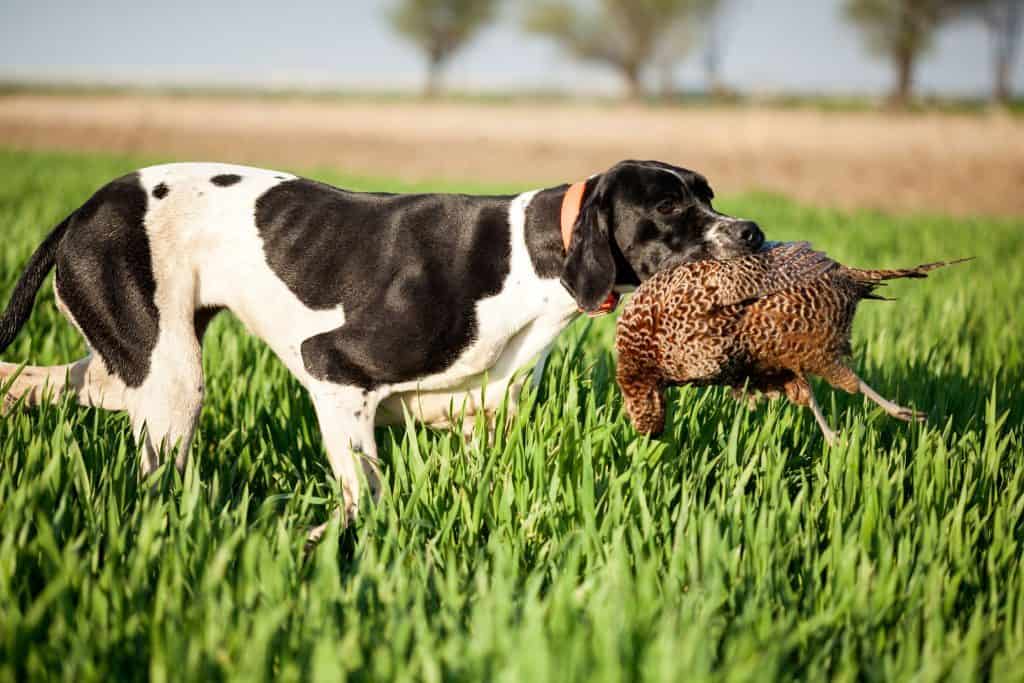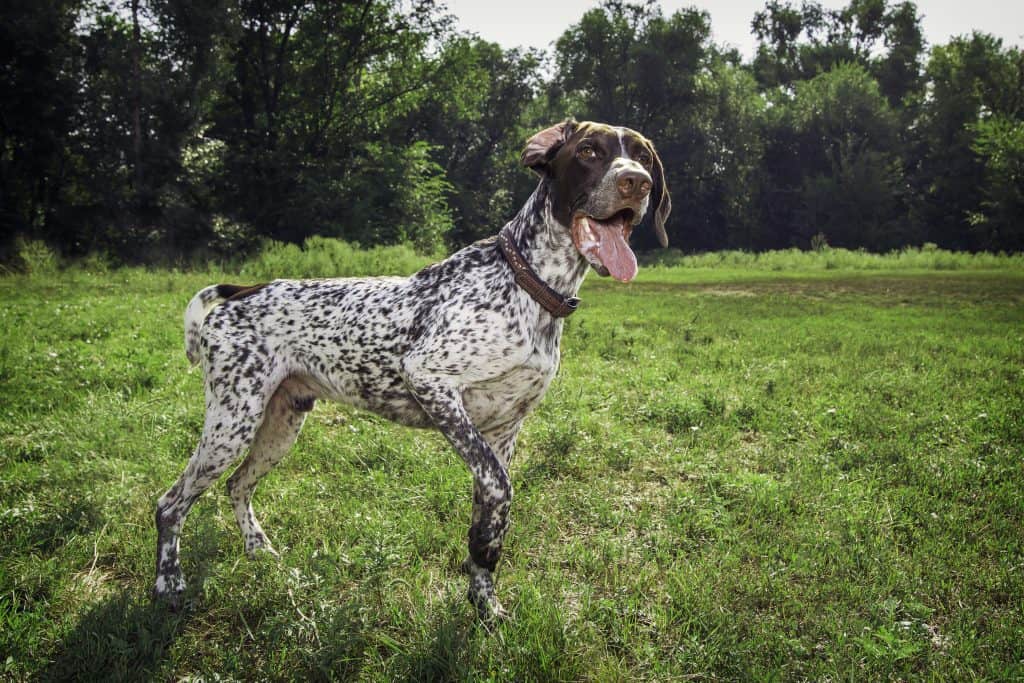Pointer Intelligence: How Smart Can You Expect Them to Be?
Knowing how much intelligence to expect out of your pointer is a good start. We all want to know if the dog we bring home is going to be smart or if he/she is going to cause us some longterm pain brought on by a more dopey nature.
Pointers are an intelligent dog breed. They are very receptive to obedience training and have natural instincts to point and assist in hunting. Pointers don’t demonstrate general intelligence but excel in obedience related intelligence.
It turns out that you can’t measure every dog breed’s level of intelligence directly against another because many more factors go into having a smart dog than a cut and dry answer of this one is the smartest and this one is not. Keep reading to learn what can make the pointer a smart dog on a different level than many other breeds can’t achieve.
The Intelligence of Pointers
Pointers are smart dogs. They learn quickly and are able to perform many tasks and analyze situations. There are a lot of things that go into their intelligence, and it can definitely vary from dog to dog based on multiple criteria.
As human beings, we thrive off of having the best. We, admittedly, like to brag and be proud of the things we have. The intelligence level of our dog is no different.
According to Claire Aerts, a dog’s intelligence is 51% genetic and the other 49% comes from a dog’s individual circumstance. Different dog breeds have certain levels of intelligence — sometimes that is general intelligence and ability to learn, and other times it’s due to instinct.
When you breed different kinds of dogs together, you can mingle and mix breeds to create a specific kind of intelligence. The intelligence levels of a pointer can be attributed to their selective breeding.
Pointers are smart enough to learn and understand the commands and tasks quickly. They demonstrate comprehension easily through the association of words with behaviors and demonstrating that understanding.
The pointer will naturally possess a certain level of intelligence that helps them track and mark prey. They are naturally able to perform the pointing position when in a situation with prey.
They are not, however, always able to perform this ability effectively, with a hunter in mind, without a lot of training. Intelligence can be taught, but it does have its limitations when it comes to the breed. Pointers can easily be trained to track and point prey and even retrieve them.
They aren’t as easy to train to do tasks that aren’t naturally suited to their breed and genetic instincts.
Multiple Intelligences in Dogs
Stanley Coren compares Howard Gardner’s 1983 Theory of Multiple Intelligences to dogs intelligence. Gardner’s theory was meant to categorize and describe the different behaviors in humans, but Coren found a way to explain intelligence in dogs using its rules and observations.
Below is a simplistic version of the 7 intelligence categories and the corresponding example in dogs taken from Stanley Coren’s book.
| Levels of Intelligence | Examples |
| Spatial | Remembering where things are located |
| Kinesthetic | In relation to the coordination of the body |
| Intrapersonal | Understanding your own physical boundaries |
| Interpersonal | The ability to get along with others (human and canine) |
| Musical | Create music (Uncertain in dogs, but unlikely) |
| Logical-Mathematical | Comparison and problem-solving (rudimentary) |
| Linguistic | Can associate words with actions |
Spatial
Spatial intelligence is very commonly seen in dogs. Simply put, this is the dog’s ability to remember where things and people are located.
It’s not like tracking people and objects; it’s completely based on a dog’s ability to map out things in their head. They can physically remember the location and find a specific door or closet in your house. This is also related to remembering where they saw someone last.
If they see you in the dining room and someone tells them to go and find you, they will go to the dining room even if you aren’t there anymore because that is the last place they remember you being.
It isn’t said outright, but pointers have spatial intelligence and are also able to find things through scent and tracking. This is another skill developed from their intelligence brought on by genetic instinct.
Kinesthetic
Pointers are historically bird and hare hunters. They stick their nose up and smell the air to locate what they’re looking for; therefore, pointers have more than just spatial intelligence because they can locate the things they want through scent.
All dogs demonstrate certain levels of kinesthetic intelligence by their ability to control their body and movements. Some dogs are categorized as clumsy, but not pointers. These dogs are extremely agile creatures and can very easily sneak quietly and carefully when hunting prey.

They are fast, and their muscled, lean bodies ensure easy and graceful movements.
Logical-Mathematical
Pointers can sometimes show good logical-mathematical intelligence through problem-solving, but they are much more driven by instinct.
Pointers, like many other breeds of dog, can understand the bigger reward when compared side to side. They can also keep count by remembering how many balls were thrown to retrieve or how many treats were shown compared to how many were actually given.
Sometimes people can train dogs to demonstrate simplistic abilities to add or subtract, but pointers are easily distracted and aren’t as patient with these types of exercises. This does not mean that they are incapable, but rather they have other things that take priority.
Linguistic
Linguistic skills in dogs are shown simply through their ability to associate our words with certain behaviors. They know that the word “heel” means that they need to stand by our side to receive some sort of reward.
They can differentiate this from “sit” when them sitting down immediately will give them the reward. This isn’t something that comes naturally; these commands need to be consistently taught through training.
Interpersonal
Interpersonal intelligence is definitely seen in pointers by their love, kindness, tolerance, and general affection of people.
They aren’t naturally aggressive towards other dogs (excluding some small dogs) and love to be social.
They do attack small animals because of predator instincts associated with their breed.
Intrapersonal
Intrapersonal intelligence is seen in most dogs. Coren’s book gives the example of a dog calculating their ability to jump onto a chair, depending on its size and the height of the chair, before actually attempting it.
Pointer’s don’t show any opposition to this intelligence, so we are inclined to understand that they have it.
Musical
Musical intelligence is claimed to exist in some dogs when owners see them responding one way or another to it; however, there is no strong evidence to suggest that dogs can create or analyze music themselves.
They can respond to it through emotions and how it stimulates their mind (negatively or positively), but there is little to support that this human intelligence exists in dogs. Dogs howl to communicate, and it can’t be proven that this demonstrates any attempt at musical intelligence.
All in all, pointers exhibit multiple versions of these intelligences. The more human parts of these intelligences can be demonstrated on the utmost basic levels, but all of the intelligences in dogs can be seen to stem from instinct, genetics, and natural drive.
General vs. Specific Intelligence in Pointers
On a table called “Ranking of Dogs for Obedience and Working Intelligence” shown in The Intelligence of Dogs written by Stanely Coren, the German Shorthaired Pointer is ranked 17th and the English Pointing dog is ranked 43rd out of 79 dog breeds for the most intelligent dog breeds.
The pointer is not known for its ability to learn any task you can think of. They are marked as really intelligent dogs by how well they can perform a certain set of skills. The pointer’s greatest strength is on the hunting field pointing prey for a hunter.
| Most Intelligent Dog Breeds List | Rank |
| German Shorthaired Pointer | 17th |
| English Pointing Dog | 43rd |
You can’t just pick any dog breed to perform this action. They may lack the natural instincts that pointers have to locate the prey. Pointers have certain abilities brought on by selective breeding.
Hunters wanted them to be able to sniff out prey, stand still and point prey, have endurance and energy for hours of hunting, and have good temperaments in general.
All of these characteristics were brought together by breeding different kinds of dogs together.
It is said that today’s English Pointer is a mixture of foxhound, greyhound, bloodhound, setting spaniel, and potentially some terrier. The exact origins are unclear, but these are the best guesses from experts throughout the years.
Originally, the Setter wasn’t a part of the pointer mix, but hunters wanted a more pleasant and less aggressive dog so they bred in the setter to achieve that.
This being said, the intelligence of all of these dog breeds came together to dictate the intelligence of the pointer. Their intelligence can be directly related back to their hunting purpose and mixed background.
They were slowly developed with the rise of new technology. At first, hunters needed a quiet and smart dog to find prey without alerting it because it took so long to reload a gun once it was misfired — you needed to get it the first time or start all over again.
With the development of a faster and more automatic gun, the pointer had less responsibility but was still necessary for the hunt. All of the experimentation with this breed has gradually led to the pointers we see today and their abilities and level of intelligence can be directly linked back to their ancestry.
All of this connects back to the idea that pointers have specific intelligence as opposed to general intelligence.
Pointers will be able to perform beautifully within their natural bounds and inherited abilities.
They are stubborn but easy to train. They remember their training and can perform pointing perfectly.
They can be taught to retrieve and mark prey. They can be taught to stay still and respond to commands. They cannot, however, be taught to do something like herding sheep as a Border Collie could. This does not mean that they’re not smart; it just means that they have very specific intelligence brought on by nature.
If you want to learn more about intelligence in dogs in general, check out this video from CuriosityStream that gives a brief overview of dog intelligence and ways to test yours.
Instinctive Intelligence
Pointers can mark prey and demonstrate the physical pointing position without any formal training. They won’t be able to perform well under the direction of a hunter without training, but the natural ability and instincts are already present when they’re born.
Other dog breeds aren’t born with these abilities and, therefore, cannot be trained to do what pointers can. Their intelligence is greatly shown by their abilities in the hunting field.
Hunting is not the only thing they’re good at. Their ability to hunt also underscores other abilities that are directly related. Pointers are loyal, hardworking, and can learn quickly.
“Although training can make a pointer’s behavior more precise and
Stanley Coren
controllable, the tendency to point is inborn.”
They are very receptive to obedience training and excel enough to perform in competitions, respond to owners, and execute tasks flawlessly when hunting.
They have the mental capacity to associate behaviors with reward. They can learn a wide vocabulary of commands and perform them correctly.
Something to keep in mind is that pointers will not just do something automatically. They have the intelligence to do it, but they must first be taught. Pointers are taught most effectively through consistency, patience, and positive reinforcement.
If they are trained properly, they will be able to demonstrate their abilities and perform as desired. They are very smart, but they won’t be able to do everything you might want them to.
As mentioned earlier, you will never be able to turn a pointer into an effective herding dog — this isn’t something that they were bred for. This doesn’t diminish their intelligence but, rather, redirects it to other things.
You wouldn’t call a world-class mathematician stupid just because he is a poor speller. He just has a different skill set that isn’t transferable to every aspect of life. Dogs are the same, but they are much more significantly dictated and confined by their genetics and natural instincts than we are.
Due to their breeding, pointers are ready to learn every aspect of hunting birds and small prey. They are able to learn different skills that are associated with what they are bred for.
Pointers are not natural bred retrievers but they can be taught to retrieve. It builds off of what they already know.
They want to get birds; they track them, they point them, the next step is to retrieve them. The dog already wants the bird, but a lot of the time they are taught to stop and wait.

They have a natural instinct to want to get the bird, whether that means they want to play with it or eat it. We harness that desire and teach them that they can get the bird but only if they do what we want with it.
The gender of dogs also can be a distinguishable factor when thinking of intelligence. In most cases, the male dogs are hard-headed problem solvers while the females are very good at obedience.
The English Pointer is an exception to that rule. Males are more obedient and easy to train when it comes to the pointer. Some have found that females are a little more stubborn than their male counterparts.
Obedience Intelligence
Something that the pointer excels in is having obedience intelligence. In Stanley Coren’s dog intelligence rankings, you can split the breeds into many groups.
According to this article in Yummy Pets magazine, English pointing dogs obeyed the first command of an evaluator 50% of the time or more which demonstrates an average level of obedience intelligence.
On a measurement of what breeds are the best working dogs, German Shorthaired Pointers were said to obey the first command of an evaluator 85% of the time or more often.
Pointers excel in obedience. This is why they are seen a lot in dog shows. They can follow commands as long as their attention is captured. Training pointers is a little more challenging because of their innate tendency to be distracted by things running around outside.
This is why patience and positive reward is so important in their training because it takes a little while to do it. They are very responsive but stubborn. They can perform beautifully, but you will have to make it worth their while.
Training indoors helps to keep them on the right track. They are smart and can pick up a variety of commands with consistency.
Their ability to take those commands and transfer it to everyday life or the hunting field is also amazing. They are smart, but their intelligence most frequently wars with their high levels of energy and distractibility.
If they are given the proper care, vigorous daily exercise, and a healthy diet, they are very easy to train and have as a companion.
A dog’s level of intelligence is more than just how well they listen, follow directions, and problem solve; it’s their ability to be taught and trained and how far they can go with that guidance.
In short, pointers don’t excel at everything, but they very are good at what they are made to do.
Intelligence Shown in Hunting
As has been touched on, selective breeding can really help to show what makes the Pointer an intelligent dog. Their masterful hunting ability is the highlight and origin of the pointer’s intelligence.
After training your pointer, the moment you let it loose in a hunting situation is when you can watch the magic unfold before your eyes.
The first part of the hunt will usually be them expelling their pent up energy. It’s difficult for them to focus while that much energy runs through them. Once they have calmed down and can focus, they start the search.
They catch a scent and follow it back and forth until they can pinpoint where the prey is located. That’s when their natural pointing comes out.
Pointers stand perfectly still with one arm raised, their entire body rigid, and point the hunter to the prey. Finally, if trained, they can retrieve the prey once it’s been downed.
This entire process shows how smart the pointer really is. Your dedication to their training mixed with their natural instincts to hunt encourages that intelligence to grow and work for you.

This intelligence, brought on by centuries of selective breeding, can transfer into the home setting. These qualities enable your pointer to be obedient within the house. He/she learns basic commands and can assist and play depending on the things you teach them.
Everything builds upon itself, but it’s important to know where the source is: they were made to be hunting companions to humans.
Having an Intelligent Pointer
Some may wonder how to make sure that they have a smart dog. There are ways to stimulate your dog’s mind and help them to achieve their natural potential for intelligent behavior and thought.
The most important part of having an intelligent dog is to start training early in the dog’s life. A lot of people will get their puppies at 8 weeks old and that is a perfect time to start training.
What this will look like early on is handling your puppy. You don’t want them to become overwhelmed and scarred by socialization, so start small. Make sure to handle your puppy and get them used to be held and handled.
This will help make them easier to train and more comfortable with you and other people throughout their lives. It’s always important to be gentle, but you want your puppy to know that it’s okay when people want to pet them or handle them in a safe manner.
Once they start to get a little bit older, you want to socialize them more and more. You want them to meet new people and new dogs; you want them to be exposed to the sounds of the streets like people on bikes, buses, and cars in general.
You want them exposed to new situations and people to help calm them down and help them understand the world outside of fear. It may be a little overwhelming at first, but keep them safe and encourage them often.
Pointers, specifically, have a little bit of wanderlust in them. They are easily distracted and will bolt after a squirrel without a second thought. It’s innate and instinctual.
With this in mind, you will want to keep your pointer on a leash at all times when out in an urban area. Your pointer may be so zeroed in on the thing that it’s chasing that it pays no mind to cars that he/she may be running in front of. A leash is always the best option.
For intelligence specifically, you want to continue challenging your pointer. Pointers require a lot of mental stimulation on top of physical exercise. They will respond well to challenging games.
You want to continue testing them throughout their lives to really help them become smarter in tasks such as problem-solving, locating prey or people, and distinguishing between two things.
The earlier you start with your pointer, the more trainable they will be throughout their lives. You are always going to be training them in some capacity, so it’s important to familiarize them with the tasks early to make them more receptive.
Another very important thing to keep in mind when you’re trying to exercise your dog’s intelligence is that you need to praise them. They need to know what intelligent things are getting them treats and reward.
The more you praise them for good behavior, the more they’ll want to perform more good behaviors for you.

It’s very important to know that the level of “smarts” your dog has will greatly depend on how you raise them. Consistent training, socializing, and attention you give your pointer, the more abilities it will be able to perform.
An intelligent pointer is not just a natural “it is” or “it isn’t”; you have to work with them and train them. Their intelligence shines through their ability to learn and understand obedience training and tasks.
I once read a quote that went like this, “If you judge a fish by its ability to climb a tree, it will spend its whole life believing that it’s stupid.” I think that perfectly sums up the point of dog intelligence; different dog breeds can do different things.
If our measure of intelligence is if a dog can herd animals then the Border Collie wins every time and pointers are utterly stupid. On the flip side, if the measurement is the ability to point birds, the Border Collie would fall from that pedestal of praise quickly.
You choose your dog breed depending on what you want out of your dog. If you want a dog that has enough intelligence to obey your commands, is teachable and shows intense loyalty, then a pointer is the dog for you.
